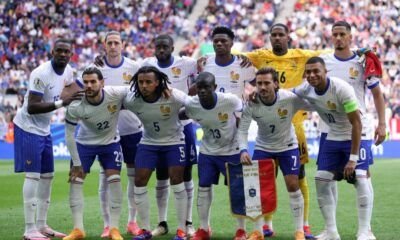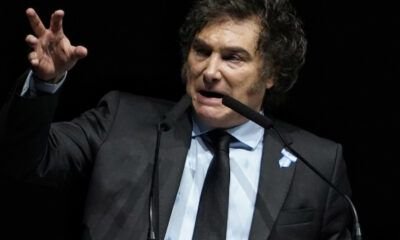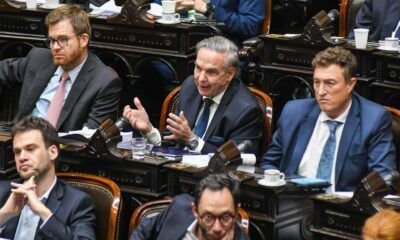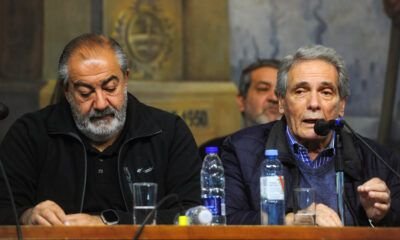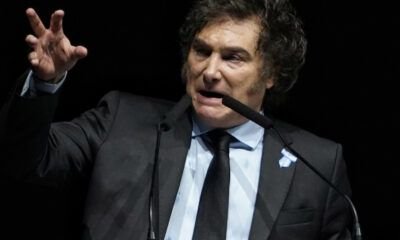INTERNACIONAL
Intento de golpe en Bolivia: un nuevo video muestra en detalle cómo fue el cara a cara del presidente Luis Arce y el general Zúñiga, con gritos y hasta el bastón de mando
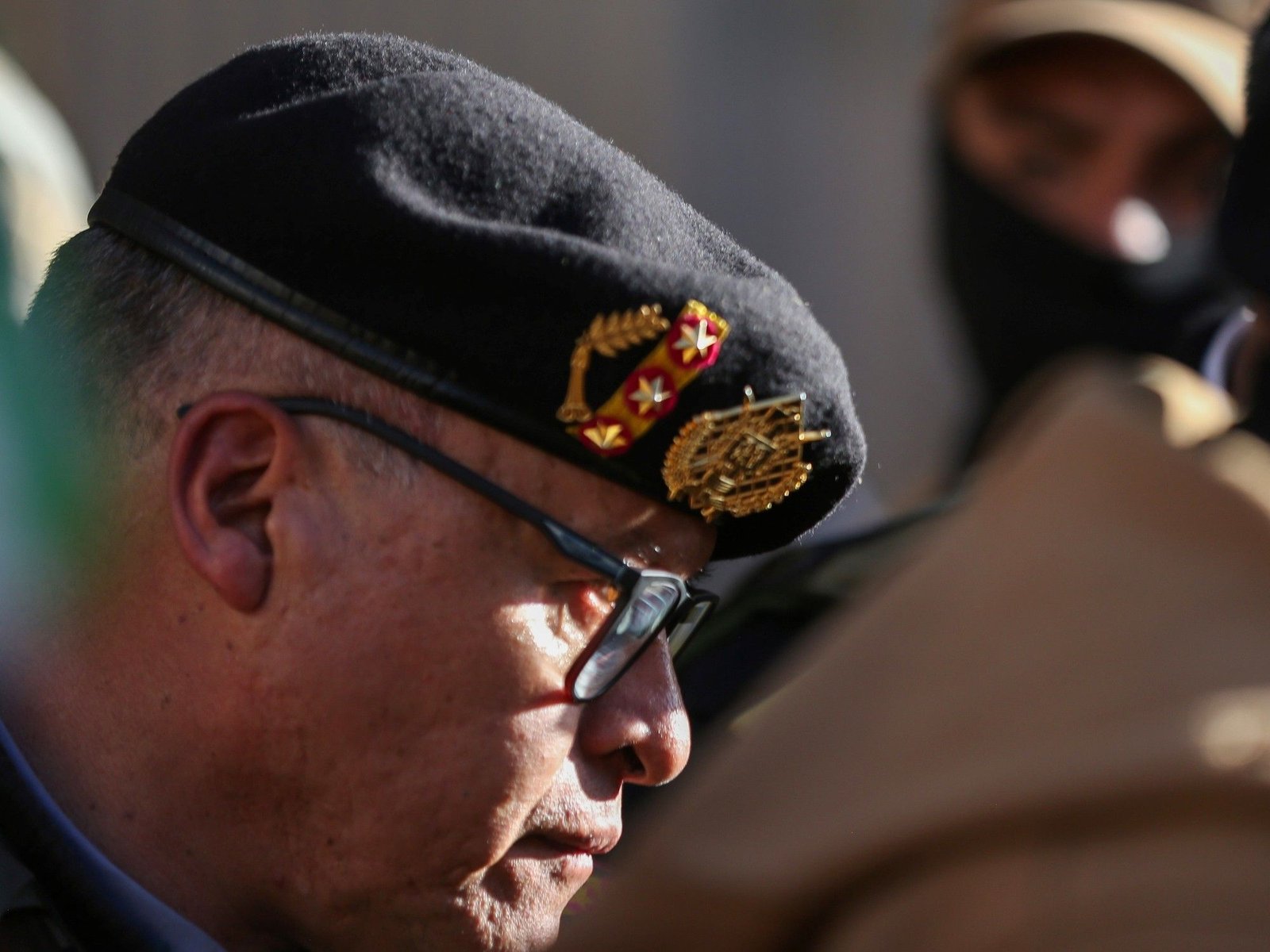
Fue quizás uno de los momentos más dramáticos del intento de Golpe de Estado en Bolivia. El cara a cara entre el presidente Luis Arce y el general Juan José Zúñiga en un pasillo del Palacio Quemado, en La Paz, sigue dando que hablar y ahora apareció un nuevo video que muestra en detalle cómo fue en dramático momento en el que el gobernante enfrenta en persona la asonada.
Custodiado por un grupo de funcionarios, entre los que se divisa a su ministro de Gobierno, Eduardo del Castillo, protagonista de uno de los videos del intento de Golpe cuando enfrentó a un militar en un blindado a los gritos, y a la ministra de Presidencia, María Nela Prada, Arce enfrenta a los tres jefes de las Fuerzas Armadas, con Zúñiga a la cabeza.
─Estamos molestos ─le dice el militar.
─Nosotros estamos molestos por esta actitud, ¿ves esto? ─lo frena Arce y le muestra el bastón de mando de la presidencia, en medio de gritos, empujones contenidos y con la tensión en el aire, con el ejército desplegado tomando la plaza frente a Casa de Gobierno.
─Acá está el comandante de la Fuerza Aérea ─señala Zúñiga, con chaleco antibalas a un militar que esta a su izquierda, también con ropa de combate.
Enseguida los gritos se apoderan de la escena.
“¡Aquie está su capitán!”, vocifera alguien detrás de Arce. “¡No podemos retroceder!”, grita otra persona. De repente, la persona que está parada junto al Presidente pide calma con un gesto, mientras Arce se mantenía firme mirando a los ojos a Zúñiga, con el bastón de mando presidencial abigarrado entre sus manos.
─Acate mi orden capitán, vuelva y repliegue a toda la policia militar a sus cuarteles ¡en este momento! ─levantó la voz Arce.
─No puede ser eso, no puede ser el desprecio, tanto desprecio ─se quejó Zúñiga, que en ningún momento dejó de masticar chicle.
─Lo que usted está haciendo contra el pueblo boliviano no se lo puedo perdonar ─respondió firme Arce.
“¡Contra la democracia!”, recrimina a viva voz la ministra María Nela Prada, una de las primera que se grabó en el Palacio Quemado denunciando en redes la intentona golpista. “¡Viva la democracia carajo!”, lanzó otro de los seguidores de Arce en medio de la conmoción.
─Si usted respeta el mando militar y se considera un buen militar, repliegue todas esas fuerzas. Es una orden. ¿No me va a hacer caso? ─lo desafió Arce.
─No ─soltó Zúñiga. Apenas dos letras le alcanzaron para resumir su insurrección-
“¡No está solo Presidente!”.
“No estamos en épocas de dictaduras”.
“El pueblo está primero”.
Todo era gritos a esa altura.
El clima se iba caldeando a medida que los militantes no deponían su actitud ni retrocedían ante la firmeza de Arce. Zúñiga permanecía estoico, masticando chicle de manera sobreactuada, casi con nerviosismo, mientras los generales a su lado titubeaban.
De repente Arce y su ministro de Gobierno apuntaron contra el jefe de la Fuerza Aérea.
─¿Usted está involucrado en esto? ─lo interpela el presidente Arce, que le muestra otra vez su bastón de mando al grito de “¿sabe qué es esto?”.
─Los tres comandantes están… ─intenta defenderlo Zúñiga, dando cuenta de que toda la cúpula apoyaba su decisión de tomar el poder por la fuerza.
─Usted no se meta ─lo frena en seco el ministro Del Castillo.
─Es el baston de mando ─responde casi con nervios el jefe de la Fuerza Aérea.
De fondo se ve cómo Zúñiga en ese momento se da vuelta y decide salir del Palacio Quemado ante la intransigencia de Luis Arce y sus gabinete que lo custodiaba.
La anatomía de ese instante que quedará grabado en la historia de Bolivia se completa con más gritos. “¡Es su capitán, general!”, dice alguien. “¡El pueblo lo va a juzgar a usted”, lo increpa otra persona. “No va a durar esto”, lanza un tercero, mientras el jefe del intento de Golpe sale del lugar.
Dos militares fueron detenidos por el intento de Golpe
Fuerzas bolivianas detuvieron el miércoles a dos jefes militares, por un intento de golpe de Estado contra el presidente Luis Arce, poco después de que militares sublevados asediaran durante horas la sede de gobierno y trataran de derribar una de sus puertas.
Al cabo de una frenética jornada, el general Juan José Zúñiga fue arrestado a las afueras de un cuartel militar de La Paz y conducido a un vehículo policial bajo cargos de terrorismo y alzamiento armado, según la fiscalía.
«íEstá detenido, mi general!», señaló el viceministro de Gobierno (Interior), Jhonny Aguilera, según imágenes de la televisión estatal.
Horas después el ministro de Gobierno (Interior), Eduardo del Castillo, informó de la detención del jefe de la Armada Boliviana (Marina), Juan Arnez Salvador, como el otro responsable.
Zúñiga estuvo al frente de los uniformados que intentaron irrumpir en el palacio presidencial, en el centro de La Paz. Sus hombres emplearon gases lacrimógenos contra las personas que quisieron acercarse al edificio.
El oficial ingresó caminando por la misma puerta que intentó derrumbar uno de los carros de combate. Poco después salió por los mismos medios.
«Estamos en un intento de golpe de Estado por militares que están manchando el uniforme», dijo Arce al tomar juramento a una nueva cúpula de las Fuerzas Armadas en el palacio que en ese momento era rodeado por las tropas de Zúñiga.
 El destituido comandante de la armada de Bolivia, Juan Arnez, es presentado en dependencias de la Fuerza Especial de Lucha Contra el Crimen. Foto EFE.
El destituido comandante de la armada de Bolivia, Juan Arnez, es presentado en dependencias de la Fuerza Especial de Lucha Contra el Crimen. Foto EFE.Tras su repliegue, el mandatario salió a un balcón para dirigirse a cientos de seguidores: «Nadie nos puede quitar la democracia que hemos ganado (…). Estamos seguros: vamos a seguir y vamos a seguir trabajando».
Tanto el gobierno como el expresidente Evo Morales, antiguo aliado y ahora rival político de Arce, habían convocado a movilizaciones ante el alzamiento militar.
En sus redes sociales, el exmandatario boliviano suspendió el llamado tras «haberse retomado la calma en la sede de gobierno».
INTERNACIONAL
France's right-wing National Rally looks to seize on recent electoral gains
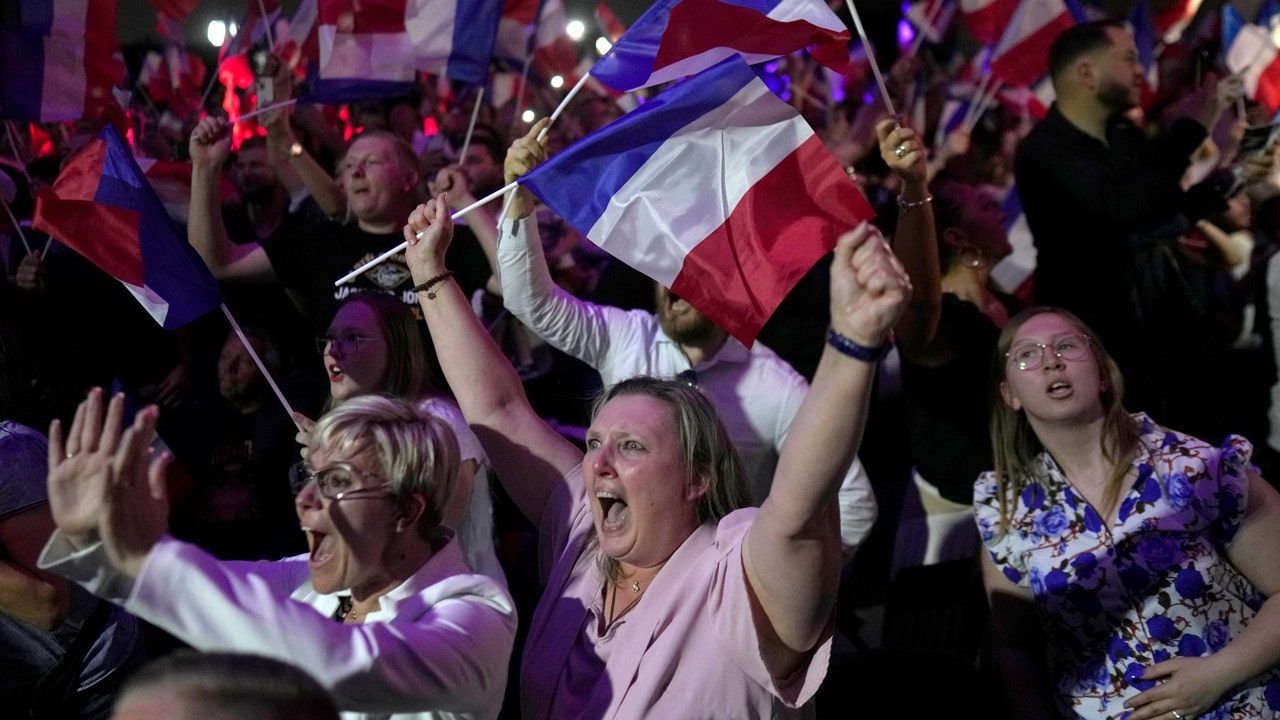
With the ultimate outcome still up in the air, France’s fiercely anti-immigration National Rally and opponents of the long-taboo far-right party scrambled Monday to capitalize on an indecisive first round of voting in surprise legislative elections.
Round one on Sunday propelled the National Rally closer than ever to government but also left open the possibility that voters could yet block its path to power in the decisive round two. France now faces two likely scenarios in what promises to be a torrid last week of high-stakes campaigning.
Strengthened by a surge of support that made it the round-one winner but not yet the overall victor, the National Rally and its allies could secure a working majority in parliament in the final round next Sunday. Or they could fall short, stymied at the last hurdle by opponents who still hope to prevent the formation of France’s first far-right government since World War II.
RIVALS MOVE TO BLOCK FRANCE’S RIGHT-WING NATIONAL PARTY’S ELECTION MOMENTUM
Both scenarios are fraught with uncertainty for France and its influence in Europe and beyond.
«Just imagine the image of France — the country of human rights, the country of enlightenment — which suddenly would become a far-right country, among others. This is inconceivable,» said Olivier Faure, a Socialist who comfortably held onto his legislative seat.
The far right tapped into voter frustration with inflation and low incomes and a sense that many French families are being left behind by globalization. National Rally leader Marine Le Pen’s party campaigned on a platform that promised to raise consumer spending power, slash immigration and take a tougher line on European Union rules. Its anti-immigration agenda has contributed to many French citizens with immigrant backgrounds feeling unwelcome in their own country.
Getting 289 or more lawmakers in the 577-seat National Assembly would give Le Pen an absolute majority and the tools to force President Emmanuel Macron to accept her 28-year-old protege, Jordan Bardella, as France’s new prime minister.
Such a power-sharing arrangement between Bardella and the centrist president would be awkward and invite conflict. Macron has said he will not step down before his second term expires in 2027.
Getting close to 289 seats might also work for Le Pen. By promising posts in the government, she may win over enough new lawmakers to her side.
A National Rally government in France would be an additional triumph for far-right and populist parties elsewhere in Europe that have steadily carved out places in the political mainstream and taken power in some countries, including Hungary. Hungarian Prime Minister Viktor Orbán will hold the European Union’s rotating presidency for the next six months.
Supporters of French far right leader Marine Le Pen react after the release of projections based on the actual vote count in select constituencies , Sunday, June 30, 2024 in Henin-Beaumont, northern France. French voters propelled the far-right National Rally to a strong lead in first-round legislative elections Sunday and plunged the country into political uncertainty, according to polling projections. (AP Photo/Thibault Camus)
But the first round of the French vote was also sufficiently undecided to offer up the alternative possibility that France’s complex, two-round system could also leave no single bloc with a clear and workable majority.
That would plunge France into unknown territory.
However, Le Pen’s opponents still view that scenario as more appealing than victory for her party, which has a history of racism, xenophobia, antisemitism and hostility toward France’s Muslims — as well as historical ties to Russia and a more adversarial attitude toward the EU.
«We are faced with a ‘Trumpization’ of the French democracy,» warned lawmaker Sandrine Rousseau, an ecologist also reelected in round one. «The second round will be absolutely crucial.»
The election, made intense by the high stakes and compressed time frame, has overshadowed preparations for Paris to host the Olympic Games, which open in less than a month.
Candidates who did not win outright in round one but qualified for round two have until 6 p.m. Tuesday to decide whether to stay in the race or withdraw. By pulling out, opponents of the National Rally might divert votes to other candidates better positioned to beat the far right next Sunday.
Some candidates announced of their own accord that they were stepping aside, making a defeat of the National Rally their top priority. In other cases, party leaders set the direction, saying they would withdraw candidates in some districts in hopes of blocking Le Pen’s path to power. She inherited her party, then called the National Front, from her father, Jean-Marie Le Pen, who has multiple convictions for racist and antisemitic hate speech.
Overall, the National Rally and its allies won a third of the nationwide vote Sunday, official results showed. The New Popular Front, a left-wing coalition of parties that joined together in the quick, three-week campaign to beat the far right, got 28% and was followed in third place by Macron’s centrist camp with 20%. But the 577 seats are elected by districts. So while nationwide results provide an overall picture of how each camp fared, they do not indicate exactly how many seats the groups will get in the end.
Bardella urged voters to give him a majority, saying they face a choice between left-wing «incendiaries» who pose «an existential threat» to France and his party’s offer of a «responsible break» with Macron’s era.
Support for the National Rally and the New Popular Front was so strong that they both won more than 30 seats outright on Sunday by taking more than 50% of the vote in some districts. That means there will be no second round in those districts.
Turnout — at nearly 67% — was the highest since 1997, arresting nearly three decades of deepening voter apathy for legislative elections and, for a growing number of French people, politics in general.
Macron dissolved the National Assembly and called the snap election on June 9, after a stinging defeat at the hands of the National Rally in French voting for the European Parliament. The deeply unpopular and weakened president gambled that the far right would not repeat that success when the country’s own fate was in the balance.
But Macron’s plan backfired. He is now accused, even by members of his own camp, of having opened a door for the National Rally by calling voters back to the ballot box, especially when so many are angry over inflation, the cost of living, immigration and at Macron himself.
If the National Rally can form a government, it has promised to dismantle many of Macron’s key domestic and foreign policies, including his pension reform that raised the retirement age. It also says it would stop French deliveries of long-range missiles to Ukraine in the war against Russia.
CLICK HERE TO GET THE FOX NEWS APP
National Rally opponents fear for civil liberties if the party takes power. It plans to boost police powers and curtail the rights of French citizens with dual nationality to work in some defense, security and nuclear-industry jobs. Macron himself warned that the far right could set France on a path to civil war.
-
POLITICA3 días ago
El presidente Javier Milei atacó al Foro de Periodismo Argentino y escala la pelea del gobierno contra los periodistas
-
POLITICA23 horas ago
Cristina Kirchner reapareció y criticó al Gobierno: “El superávit fiscal es cada vez más trucho”
-
POLITICA1 día ago
Fuerte reclamo de la oposición dialoguista al Gobierno por la crisis económica tras la sanción de la Ley Bases
-
ECONOMIA2 días ago
Los precios del supermercado en Argentina ya son más caros que en España
-
POLITICA2 días ago
La CGT contra el impuesto a las Ganancias: «El ajuste lo pagan los trabajadores»
-
POLITICA16 horas ago
Los mercados castigan a Milei, la ayuda de los «dinosaurios» y una anomalía del Senado















